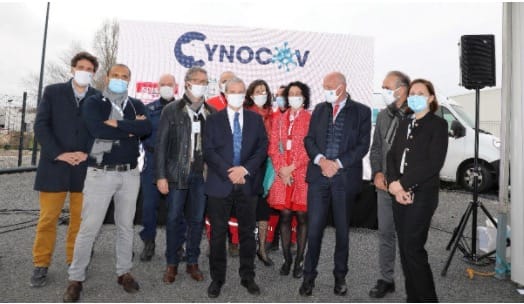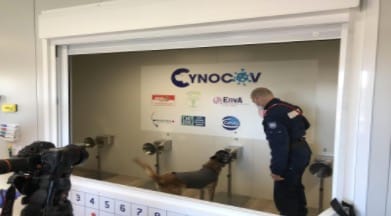During January 2021 EnvA (National Veterinary school of Maisons-Alfort), UHC (Bordeaux University Hospital Centre) and Ceva Santé Animale initiated, along with several regional players, a training programme, CYNOCOV, to retrain service dogs to detect Covid-19. The “One Health” programme combines transdisciplinary expertise, human and veterinary health with animal expertise, to train dogs to recognise the smell of a Covid-19 positive individual (even from the early stage of infection) by sniffing their perspiration.
Presentation of the Covid 19 detection dog training program in the presence of Alain Rousset, President of the Nouvelle-Aquitaine Region, Philippe Buisson, Mayor of Libourne, Stéphanie Fazi-leblanc, Deputy Director General of Bordeaux University Hospital Centre, Marc Prikazsky, CEO of Ceva Santé Animale, Lieutenant-Colonel Bruno Carré of SDIS 33 and Colonel Lionel Nicot of the Nouvelle Aquitaine Region Gendarmerie (Friday, January 29, 2021)
Through the "Nosaïs-Covid-19" project, Professor Dominique Grandjean of the National Veterinary School of Maisons-Alfort (EnvA) developed a scientifically validated method for training detection dogs to identify Covid positive patients through sampling perspiration collected with swabs from their armpits (a non-invasive and non-contaminating sampling method).
With the methodological support of EnvA, the Infectious Diseases Department of the Bordeaux University Hospital Centre (UHC) and Ceva developed a scientific protocol designed to identify patients with mild or few symptoms of Covid-19. Once taken, UHC sends samples to the CYNOCOV programme training centre, based at Ceva’s Headquarters in Libourne, France.
The Nouvelle-Aquitaine Region Gendarmerie and the SDIS 33 (Gironde Fire Department) provided four dog handlers with five detection dogs for the 2 month training programme. Each dog learns to distinguish by smell, (olfactory difference), the difference between samples from people with early stage Covid-19 and samples from uninfected individuals. Their progress is duly catalogued and recorded throughout the progression phase.
"The average observed for the sensitivity and specificity of the dogs is around 95% across all the studies conducted to date", explains Pr Dominique Grandjean.
At the end of this training, the aptitude of the detection dogs will be validated and tested at the training center by the UHC team across a representative number of all samples. Depending on the results, a mobile unit could be deployed in several cities of the New-Aquitaine region as a pre-selection method of screening, according to prior validations by competent authorities.
The Cynocov study is the perfect illustration of the "One Health" commitment between public and private actors of human and veterinary health, in the search for solutions contributing to the control of the Covid-19 epidemic.
ABOUT
The Nosaïs project, led by Pr. Grandjean of the National Veterinary School of Maisons-Alfort, develops and evaluates methodologies for training dogs in the early detection of chronic or infectious human pathologies. Since March 2020, the Nosaïs project has scientifically validated the principle of using detection dogs in the search for covid-positive patients on the basis of sweat samples. www.vet-alfort.fr
The Bordeaux University Hospital Centre (UHC), with 14,200 professionals, including 1,500 doctors, is the largest employer in Nouvelle-Aquitaine. Recognized for the excellence of its care, it welcomes one million patients each year. Its Infectious and Tropical Diseases Department is particularly mobilized in the fight against the Covid-19 epidemic, in particular with the Cynocov research project of which it is the main partner. www.chu-bordeaux.fr
Ceva Santé Animale, the French leader in animal health, is committed to the "one health" approach. "What concerns animal and vegetal health will impact human health. It is the concept of one health on our planet that drives our society on a daily basis", explains Dr Marc Prikazsky, Ceva CEO. www.ceva.com/en
The Gironde Departmental Fire and Rescue Service (SDIS 33), with more than 5,400 agents, ensures the protection of people, property and the environment on a daily basis. In 2020, the SDIS 33 carried out more than 124,000 operations to rescue people, fight fires and protect against natural and technological disasters and catastrophes.
The Gendarmerie region of Nouvelle-Aquitaine and the SDIS of Gironde each provide two dog-team pairs for the Cynocov study, which trains dogs to detect samples from Covid-positive patients and evaluates its potential practical applications.
This project illustrates the willingness of the Nouvelle-Aquitaine Region to be part of the "One Health" global health concept with the players in human and animal health, particularly in the detection of infectious diseases. www.nouvelle-aquitaine.fr

 Corporate Website
Corporate Website
 Africa
Africa
 Argentina
Argentina
 Asia
Asia
 Australia
Australia
 Belgium
Belgium
 Brazil
Brazil
 Bulgaria
Bulgaria
 Canada (EN)
Canada (EN)
 Chile
Chile
 China
China
 Colombia
Colombia
 Denmark
Denmark
 Egypt
Egypt
 France
France
 Germany
Germany
 Greece
Greece
 Hungary
Hungary
 Indonesia
Indonesia
 Italia
Italia
 India
India
 Japan
Japan
 Korea
Korea
 Malaysia
Malaysia
 Mexico
Mexico
 Middle East
Middle East
 Netherlands
Netherlands
 Peru
Peru
 Philippines
Philippines
 Poland
Poland
 Portugal
Portugal
 Romania
Romania
 Russia
Russia
 South Africa
South Africa
 Spain
Spain
 Sweden
Sweden
 Thailand
Thailand
 Tunisia
Tunisia
 Turkey
Turkey
 Ukraine
Ukraine
 United Kingdom
United Kingdom
 USA
USA
 Vietnam
Vietnam


